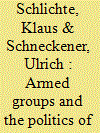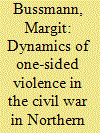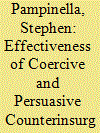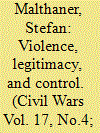| Srl | Item |
| 1 |
ID:
143538


|
|
|
|
|
| Summary/Abstract |
This article serves as an introduction to a special section on the question of the legitimacy of non-state armed groups. Starting with a short discussion of the literature on armed groups as political actors, the authors emphasize the importance of the often-underestimated dimension of legitimacy. After having conceptualized legitimacy in more detail, the article addresses three key challenges armed groups usually face regarding the politics of legitimacy: first, they need to legitimize the use of violent means; second, for moral and material support, they depend on beliefs of legitimacy; and third, they need to simultaneously address various domestic and international audiences. Finally, the authors highlight a number of pending questions for further research on armed groups.
|
|
|
|
|
|
|
|
|
|
|
|
|
|
|
|
| 2 |
ID:
143541


|
|
|
|
|
| Summary/Abstract |
The analysis aims at detecting patterns in the use of violence against the civilian population in the Civil War that was fought in the North of Uganda by the Lord’s Resistance Army (LRA), an armed group that is known for its atrocities. One-sided violence increased with a decline in popular support and was related to the support of an external patron who influenced the relative military strength. The results of the quantitative analysis indicate that the LRA’s use of violence varied systematically with battle-related activities and was higher after the LRA had to suffer losses in combat.
|
|
|
|
|
|
|
|
|
|
|
|
|
|
|
|
| 3 |
ID:
143543


|
|
|
|
|
| Summary/Abstract |
Which counterinsurgency approaches are most effective in defeating insurgencies? Counterinsurgency advocates and critics have debated the effectiveness of winning hearts and minds as well as using brute force against ordinary civilians. But little scholarship has sought to systemically compare these counterinsurgency approaches among a broad range of cases. This paper seeks to remedy this gap in the literature with an empirical analysis of 47 counterinsurgency wars from 1945–2000 to evaluate the effectiveness of coercive and persuasive approaches to counterinsurgency. To do so, I use crisp-set qualitative comparative analysis (QCA), or Boolean analysis, to identify the presence or absence of six coercive and persuasive counterinsurgency practices across all cases. This method enables me to highlight how counterinsurgency victory can be produced by combinations of practices rather than a single set of practices that might be expected to be useful across cases. The results demonstrate that many combinations of coercive, persuasive, and mixed counterinsurgency practices can lead to victory. However, more persuasive combinations of practices consistently lead to counterinsurgent victory compared to others, although limited coercion against civilians is constant in all cases of counterinsurgency. These findings cast doubt on the ability of counterinsurgents to refrain from harming civilians and suggest that victory requires a mix of both positive and negative incentives for cooperation.
|
|
|
|
|
|
|
|
|
|
|
|
|
|
|
|
| 4 |
ID:
143540


|
|
|
|
|
| Summary/Abstract |
This article investigates legitimacy and foreign relations of Liberia’s two most important recent rulers. It argues that Charles Taylor was widely considered legitimate in Liberia and that the Weberian concept of charismatic authority best explains the popularity of the former warlord and president. Charisma, however, is tied to specific cultural contexts and Taylor’s popularity was not intelligible to Western audiences. By contrast, Johnson Sirleaf frames her policies in terms appealing to both the domestic and international audiences. As a consequence, she succeeded to attract significant foreign assistance enabling her to increase legitimacy and strengthen stability.
|
|
|
|
|
|
|
|
|
|
|
|
|
|
|
|
| 5 |
ID:
143542


|
|
|
|
|
| Summary/Abstract |
Most countries of the Arab Mashrek are multi-ethnic and multi-sectarian. In recent years, most of them have experienced violent clashes between groups that frame their conflicts along ethnic-sectarian lines. This article investigates the Lebanese Ta’if Agreement of 1989 as a crucial case study of how to manage such conflicts through a transitory power-sharing arrangement. It presents several provisions of this agreement that adhere to three different approaches of how to deal with such conflicts: the consociational and the centripetal models of power-sharing as well as the integrationist paradigm. It thereby seeks to develop a theoretical argument about chances and risks of transitory power-sharing in deeply divided societies and derives some general lessons for managing conflicts in the Middle East.
|
|
|
|
|
|
|
|
|
|
|
|
|
|
|
|
| 6 |
ID:
143539


|
|
|
|
|
| Summary/Abstract |
When police moved against a mosque known to be a stronghold of al-Jamaa al-Islamiyya (The Islamic Group) in a neighbourhood in northeastern Cairo in summer 1988, they quickly became involved in street battles in which they were confronted not only by members of the militant Islamist group but also by many ordinary residents, including teenagers and elderly women throwing stones from balconies. It was obvious that the group had built a considerable base of support in the area: ‘They were very good young people’, one resident explained. The Islamists ‘used to have very active social work around their mosque. […] They collected donations for needy families and intervened in family disputes;’ and people, as he recounted, ‘admired their bravery to voice something the government does not want’ (Interview with residents of Ayn Shams, Cairo, March 2005). Yet, the resistance proved short-lived. When the neighbourhood was put under a curfew after the riots, people gradually withdrew from the group and many young followers shaved and changed their white galabiyya for a pair of trousers.
|
|
|
|
|
|
|
|
|
|
|
|
|
|
|
|